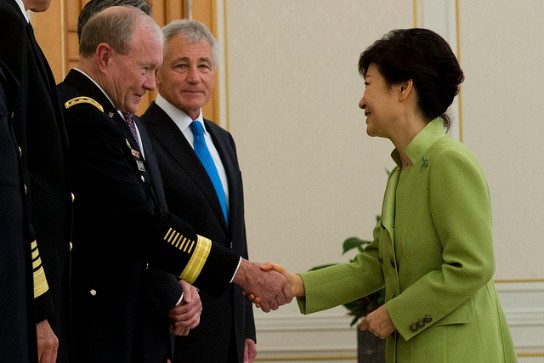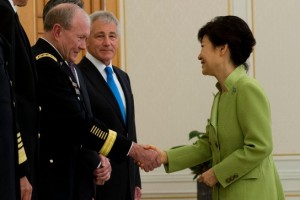
North Korea and the Nuclear Domino Effect
Last week, the South Korean President Park Geun-hye made a statement warning against another North Korean nuclear test. She stressed that this could lead to a domino effect, in which other countries in the region may begin to see this as a threat and arm themselves with their own nuclear arsenals in response to North Korea’s actions, resulting in nuclear proliferation. Not only could this nuclear test continue to upset the feeling of security in East Asia, but it could also bring North Korea closer to creating a nuclear weapon.
Japan and South Korea are already under pressure from some political groups in their countries to obtain nuclear weapons as a deterrent, which would therefore bring China into the picture. Park added that, “China plays a role of a critical mainstay in upholding peace and stability on the Korean peninsula.” At the same time, Park upholds a policy of “trustpolitik” with North Korea, encouraging openness between the two countries while maintaining a strong defense stance.
Further bolstering its defenses against the North, South Korea purchased Textron Anti-Armor weapons last week from the Pentagon. By 2016, it will receive 361 war-ready versions of Sensor Fuzed Weapons (SFW) for $190 million. In 2016, the country will also receive the first of 36 AH-64 Apache Longbow helicopters capable of spotting targets while hovering behind ridgelines and hills, in addition to four Global Hawk reconnaissance drones. These are all steps being taken before December 2015, when America will hand back its command over South Korea’s defenses.
A new North Korean nuclear test would further upset the stability in East Asia, stimulating U.S. efforts to help form a coordinated multinational effort to defend against the threat. Earlier this week, the United States began to consider deploying an advanced missile defense system in South Korea in order to counter any potential North Korean threat. Thus far, the US has considered possible sites for a Terminal High-Altitude Area Defense battery (THAAD) in South Korea, in an attempt to foster missile defense cooperation between the US, Japan, and South Korea. Vice Chairman of the Joint Chiefs of Staff Adm. Winnefeld on Wednesday stated although tensions still exist between Japan and Korea, “progress in this area would only increase our confidence in the face of persistent North Korean provocations.”
Taking all of this into perspective, Cold War ideas about nuclear deterrence are unlikely to apply in the case of rogue nations like North Korea. As noted in ASP’s “The 21st Century Nuclear Arsenal,” historical ideas surrounding nuclear deterrence need to be reexamined, and the U.S. should more seriously analyze the strategic objectives of rogue nations in order to develop truly effective methods of deterrence.
Theresa Shaffer is a nuclear security researcher and intern at the American Security Project. She is a recent graduate of the University of North Texas with degrees in International Studies and French. You can follow her on twitter here: Theresa Shaffer







Article reveals that instead of a nuclear weapons free world,
the rogue nations are indulging in nuclear weapons proliferation.
Like South Korea INDIA is facing the same dilema from a failed,
epicenter of terroroist nation Pakistan. USA must rein in Pakistan.
Their nuclear weapons are in the hands of military, whereas in
India it is with the elected govt. China provided nuclear weapons
technology to Pakistan. It is a unholy nexus between China, Pakistan
against India. So far India has professed no first use of nuclear
weapons.Pakistan is always provoking India on its borders owing
to the fact that they possess nuclear weapons. Not a very healthy
situation as the fundamentalist Pak ARMY CANNOT BE TRUSTED.
North KOREANS CANNOT BE TRUSTED EITHER.
Very incisive article
Already commented posted